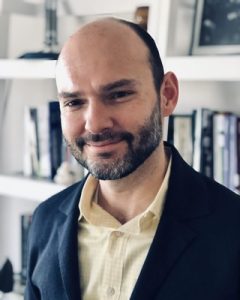Living the Non-Dream: An Examination of the Links Between Dreaming, Enactment, and Transformations in hallucinosis
by Rodrigo Barahona, PsyaD
Abstract
Bion developed a clinical theory of therapeutic action that asks the analyst to interact with and catalyze the patient’s ability to dream an emotionally real experience of himself. The intersubjective engagement that, at every moment, underpins the analytic experience generates moments of enactment that are necessary for the bringing to light and transformation of unrepresented states at the center of the patient’s problems. Decades of Bionian scholarship and practice around the concept of transformation in hallucinosis, and newer work on dreaming and non-dreaming states by Cassorla, can allow us to see the connective tissue between enactment and deeper layers of the mind involved in the capacity to think, dream, and be fully human. An understanding of these connections can help the analyst re-engage with his dreaming and symbolic capacity, hampered by the enactment, and bring to focus the undreamt dream at the center of the patient’s current anxiety.
The Psychoanalytic Quarterly, 89:4, 689-714, October 2020.
Link to Online Publication [fulltext can be downloaded in, or requested from, the library]
About the Author

Rodrigo Barahona, Psya. D., is a psychoanalyst in private practice in Brookline, Massachusetts. He is a graduate of the Psychoanalytic Institute of New England (PINE), and a faculty member of the Boston Psychoanalytic Society and Institute. Dr. Barahona is a board member of the Boston Group for Psychoanalytic Studies, and is an editorial associate for the International Journal of Psychoanalysis, The Psychoanalytic Quarterly, and The Journal of the American Psychoanalytic Association. He is a member of the American Psychoanalytic Association and the International Psychoanalytic Association. Dr. Barahona regularly reviews Latin American and Spanish psychoanalytic literature. Click here to check out his other recent publications.
Previous Posts:
Sarah Ackerman, PhD (2020). A Diagnosis for Psychoanalysis in the 21st Century: Freud as Medicine. The Psychoanalytic Quarterly, 89:4, 667-688.
Lora Tessman, PhD (2020). Review of Ghost in the Human Psyche: The Story of a ‘Muslim Armenian’ , by Vamik D. Volkan. Contemporary Psychoanalysis, 56(2-3):457-464.
Steven H. Cooper, PhD (2019). A Theory of the Setting: The Transformation of Unrepresented Experience and Play. The International Journal of Psychoanalysis, 100:6, 1439-1454.
Anton Hart, PhD (2020). Principles For Teaching Issues Of Diversity In A Psychoanalytic Context. Contemporary Psychoanalysis, 56:2-3, 404-417.
Lawrence J. Brown, PhD (2020). Trauma and Representation. The International Journal of Psychoanalysis, 100:6, 1154-1170.
Penelope Moore, LICSW (2020). Incest from a Young Age … Lasting a Lifetime. Psychodynamic Psychiatry, 48(1), 41-54.
Judith L. Kantrowitz, PhD (2020). A Psychoanalytic Memoir: The Analyst Enabled and Disabled by What is Personal. Journal of the American Psychoanalytic Association, 68(1), 83–100.
Cuneyt Iscan, MD (2020). Learning Along the Way: Further Reflections on Psychoanalysis and Psychotherapy by Patrick Casement, Routledge, Abingdon and New York, 2019, 156pp. American Journal of Psychoanalysis, 80:2, 235-239.
Anna Ornstein, MD (2020). The Relativity of Morality in the Contemporary World. Psychoanalytic Inquiry, 40:4, 223-233.
Sarah Ackerman, PhD (2020). Impossible Ethics. Journal of the American Psychoanalytic Association. 2020;68(4):561-582.
Cordelia Schmidt-Hellerau, PhD (2020). How Demagogy Works: Reflections on Aggression in Politically Fraught Times. Psychoanalytic Inquiry, 40:4, 234-242
Judy Yanof, MD (2020). A Separation: Breaking Up Is Hard to Do. The Psychoanalytic Study of the Child, 73:1, 172-181.
Elsa Ronningstam et al. (2020). Psychotherapeutic Treatment of Depressive Symptoms in Patients with Narcissistic Disturbances: A Review. Journal of Contemporary Psychotherapy, 50, 21–28.
John C. Foehl (2020). Lived Depth: A Phenomenology of Psychoanalytic Process and Identity. Psychoanalytic Inquiry, 40(2), 131-146.
Click here to see a full archive of featured papers. All articles can be requested from the library.

